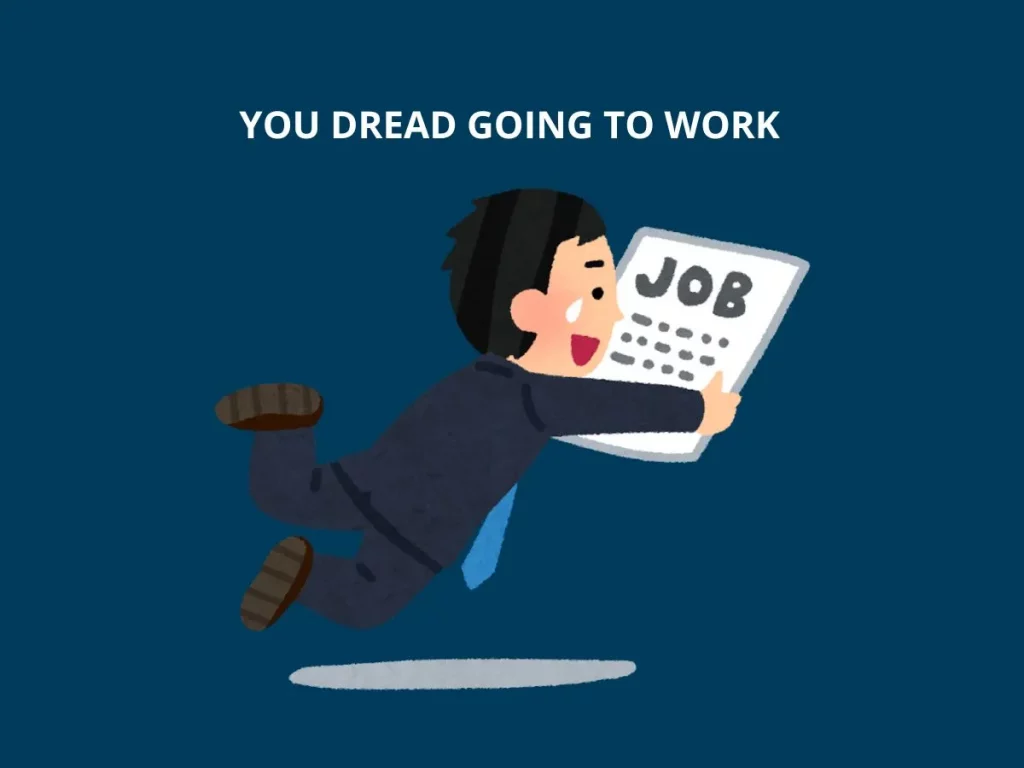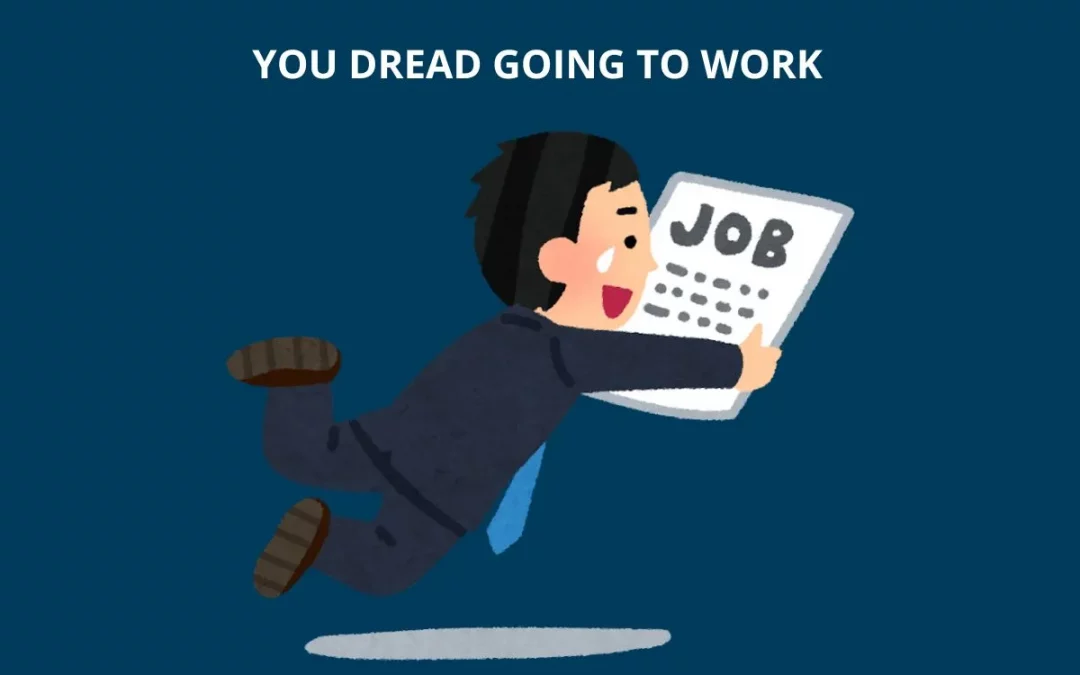Are you feeling stuck in your job, unsure if it’s time to make a change? If the work that once excited you now feels like a heavy burden, you’re not alone.
Career dissatisfaction is a common problem that affects people worldwide. It can lead to stress, unhappiness, and a sense of being trapped. But how do you know if it’s a temporary slump or a sign that it’s time for a career change?
Luckily, there are clear signs that can help you take control of your career path. By recognizing these signs, you can make informed decisions and move toward a career that truly fulfills you.
In this post, we’ll explore ten key indicators that it might be time for a career change. We’ll look at everything from workplace stress to skill underutilization. These signs will help you assess your current situation and guide you towards making the right choice for your future.
Table of Contents

You Dread Going to Work
Remember, your career should be more than just a paycheck. It should be a source of growth, satisfaction, and personal fulfilment. If you’re feeling unsure about your current job, keep reading. These ten signs could be the push you need to finally pursue a career that excites you.
One of the clearest signs of career dissatisfaction is when you start to dread going to work. If your job has become more of a burden than a source of excitement, it’s time to pay attention.
This dread can show up in different ways. Maybe you find yourself hitting the snooze button more often, trying to delay the start of your workday. Or perhaps you spend Sunday evenings feeling anxious about the week ahead, instead of relaxing and recharging.
When work becomes a source of stress rather than fulfilment, it can affect your overall well-being. You might notice changes in your sleep patterns, eating habits, or even your relationships outside of work. When your job affects your sleep, diet, and relationships, it’s more than just work stress—it’s a sign something needs to change.
It’s important to remember that while all jobs have their ups and downs, constantly dreading work isn’t normal or healthy. If you find yourself in this situation, it might be time to reassess your career path and consider making a change. Your work should be a source of satisfaction and growth, not a daily struggle.

Your Skills Are Underutilized
Feeling like your talents are going to waste at work? This is a common sign of skill underutilization, and it’s a key indicator that it might be time for a career change.
When you’re not using your full potential, work can become boring and unfulfilling. You might breeze through tasks without challenge or engagement. This lack of challenge can lead to a sense of stagnation in your professional growth.
If you’ve developed new skills through training or personal projects but have no opportunity to use them, it might be time to seek a role that makes better use of your abilities.
When your skills aren’t fully used, both you and your employer miss out. You miss chances to grow and contribute more, while your employer misses out on your full potential.
If you find yourself in this situation, it might be time to look for opportunities that better match your skill set. Remember, a fulfilling career should allow you to use and develop your talents to their fullest extent.
You’re Constantly Stressed or Anxious
Occasional work stress is normal. But when these feelings become persistent issues, it’s a sign that something isn’t right. Workplace stress can have a serious impact on your overall well-being and quality of life.
Do you find yourself worrying about work even when you’re not there? Maybe you’re having trouble sleeping because your mind is racing with work-related thoughts. Or perhaps you’re experiencing physical symptoms like headaches, muscle tension, or stomach issues that seem to be linked to your job stress.
It’s important to recognize that while some level of stress can be motivating, constant anxiety is harmful. It can lead to burnout, affect your personal relationships, and even cause long-term health problems. If you’re always on edge about work, it’s not just exhausting—it’s unsustainable.
Sometimes, work-related anxiety can be addressed through stress management techniques or by talking to your supervisor about your workload. However, if the stress is deeply rooted in the nature of your job or the workplace culture, it might be a sign that you need a bigger change.
Remember, your job shouldn’t come at the cost of your mental health. If you’re constantly stressed or anxious about work, it might be time to explore other career options that better align with your well-being.
There’s No Room for Growth

Lack of growth feels like being stuck in place, no matter how hard you work. This lack of progress can be a clear sign that it’s time for a career change.
Growth in your career isn’t just about getting promotions. It’s about learning new skills, taking on more responsibilities, and facing new challenges. If you’ve been in the same role for a long time with no chance to advance, you might be experiencing a career plateau.
Maybe you’ve asked for more training or opportunities, but your requests have been ignored. Or perhaps your company doesn’t have any higher positions for you to move into. Whatever the reason, feeling like you’ve reached a dead end can be demotivating.
Without room for growth, you might find yourself losing interest in your work. You could start feeling bored, unchallenged, or even resentful. This stagnation can affect not just your job satisfaction, but also your overall sense of purpose and fulfilment.
Remember, your career should be a journey of continuous learning and improvement. If you feel like you’ve stopped moving forward, it might be time to look for new opportunities that offer the growth you’re seeking.
Your Values Don’t Align with Your Job
When your personal values clash with your job, it can create a deep sense of discomfort and dissatisfaction. A mismatch in values is a strong sign it’s time for a career change.
Your values are the principles that guide your life decisions. They shape what you consider important and meaningful. When your work doesn’t match these values, it can feel like you’re living a double life or compromising your integrity.
For example, you might value environmental sustainability, but work for a company that doesn’t prioritize eco-friendly practices. Or perhaps you believe in work-life balance, but your job demands long hours that leave little time for personal life.
When your job conflicts with your core values, it can create guilt, frustration, or even a sense of compromise. You might find yourself questioning company policies or feeling uneasy about business practices. Over time, this can erode your job satisfaction and overall happiness.
It’s important to recognize that aligning your career with your values isn’t just about feeling good. It’s about living authentically and finding purpose in your work. If you constantly feel at odds with your job’s values, it might be time to seek a career that better reflects what you believe in.
Money Is Your Only Motivation.
While a good salary is important, if money is the only thing keeping you in your job, it might be time to reconsider your career path. Being motivated solely by financial rewards can lead to a lack of job satisfaction and personal fulfilment.
Of course, we all need to earn a living. But if your paycheck is the only thing keeping you there, it’s time to ask: what’s the real cost? You might find yourself counting down the hours each day, living for the weekends, and feeling a sense of emptiness despite your financial stability.
This situation often leads to a cycle of golden handcuffs. You become used to a certain lifestyle that your salary affords, making it harder to consider other options. But at what cost? Your mental health, personal growth, and overall happiness can suffer when you’re only working for the money.
Remember, a truly rewarding career should offer more than just financial benefits. It should provide a sense of purpose, opportunities for growth, and alignment with your personal values.
If you find that your salary is the only positive aspect of your job, it might be time to explore career options that offer both financial and personal satisfaction.
Don’t let the fear of earning less hold you back from finding a more fulfilling career path. Sometimes, taking a step back financially can lead to greater rewards in terms of happiness and long-term career growth.
You’ve Lost Your Passion
Remember when you first started your job? You probably felt excited and eager to tackle new challenges. But now, that spark seems to have faded. Losing your passion for work is a clear sign that it might be time for a career change.
Passion is what drives us to excel and find joy in our work. When it’s gone, work can feel like a chore. You might find yourself just going through the motions, doing the bare minimum to get by. This lack of enthusiasm can affect your performance and your overall job satisfaction.
Sometimes, new challenges can reignite passion—but if you’ve tried and still feel uninspired, it might be time to move on.
Losing your passion doesn’t mean you’re failing. It could simply mean you’ve outgrown your current position or that your interests have changed over time. It’s natural for our career goals and aspirations to evolve as we grow and gain new experiences.
If you find yourself longing for the days when you felt excited about your work, it might be time to explore new career paths that align with your current interests and goals.
Your Industry Is Becoming Obsolete
With rapid technological changes, industry obsolescence is a real concern in many sectors. New technologies, changing consumer habits, or global trends can make once-thriving industries less relevant. For example, think about how streaming services have impacted video rental stores, or how online shopping has changed the retail landscape.
If you’re noticing signs of decline in your industry, it’s important to be proactive. You might see fewer job openings in your field, or hear about companies downsizing or closing. These are all indicators that your industry might be facing challenges.
Staying in a declining industry can limit your career prospects and job security. It might become harder to find new opportunities or advance in your career. Plus, your skills might become less valuable in the job market over time.
The good news? Recognizing this trend early gives you a chance to adapt. You can start learning new skills, exploring related fields, or even completely reinventing your career path. Remember, many skills are transferable across industries. Your experience is valuable – it’s just about finding the right new direction.
You Daydream About Other Careers
Do you find yourself constantly thinking about other jobs? If you’re often daydreaming about different careers, it might be a sign that you’re ready for a change.
Career path revaluation is a normal part of professional growth. It’s okay to wonder “what if” and imagine yourself in different roles. But if these daydreams are becoming more frequent or intense, they might be telling you something important.
Maybe you catch yourself browsing job listings for completely different fields. Or perhaps you feel a twinge of envy when friends talk about their work. These feelings are your mind’s way of exploring other possibilities.
Daydreaming about other careers might reveal passions you’ve overlooked. It might be pointing you towards interests or skills you’ve neglected in your current job. Pay attention to the types of careers you’re drawn to – they could hold clues about what you’re really looking for in your work life.
Remember, it’s never too late to make a career change. Many successful people have switched careers, even later in life. If you’re constantly imagining a different career, maybe it’s time to stop dreaming and start exploring.
Your Work-Life Balance Is Suffering
A healthy work-life balance is crucial for your overall well-being. If your job is constantly interfering with your personal life, it might be a sign that it’s time for a career change.
Poor work-life balance can manifest in many ways. Maybe you’re always working late, missing important family events, or feeling too exhausted to enjoy your free time. You might find yourself checking work emails during dinner or worrying about job tasks on weekends.
This imbalance can lead to burnout, affecting both your physical and mental health. It can strain your relationships, limit your personal growth, and leave you feeling unfulfilled despite professional success.
Sometimes, work-life balance struggles are temporary, like during a big project. But if it’s a constant issue, it might be a sign of a deeper problem with your job or career choice.
Remember, a fulfilling career should enhance your life, not consume it. If you’re constantly sacrificing your personal life for work, it might be time to look for a career that allows for a healthier balance. This could mean finding a new job with better hours, or even switching to a career field that values work-life balance more highly.
Your time and energy are precious. A career that respects your need for a personal life is not just a luxury – it’s essential for your long-term happiness and success.
Conclusion
Making a career change can feel overwhelming, but recognizing the signs can guide you in the right direction. If you see yourself in any of the situations we discussed, take a moment to reflect on what truly matters to you. Consider your skills, passions, and values as you think about your next steps. Remember, it’s okay to seek out new opportunities that align with who you are and what you want. You deserve work that excites you.
You deserve work that excites you—a career that challenges and fulfills you. It’s never too late to make that happen. If you’re ready to take the next step, explore your options, seek guidance, and start building a career that excites you. And if you need support, I’m here to help you navigate this journey and find the right path for you.”
FAQs
1. How do I know if I need a career change?
Look for signs like feeling constantly stressed, dreading work, or noticing that your skills aren’t being used. If you often daydream about different jobs, it might be time for a change.
2. What should I do if I feel stuck in my job?
Start by assessing what you enjoy and what you’re passionate about. Consider talking to a career counsellor or exploring new job opportunities that align with your interests.
3. Is it normal to feel unfulfilled in my job?
Yes, many people experience job dissatisfaction at some point. It’s important to recognize these feelings and decide if a change is needed for your happiness.
4. Can I change careers if I’ve been in my job for a long time?
Absolutely! Many people switch careers later in life. It’s never too late to pursue something new that excites you.
5. What if I’m afraid of making less money in a new job?
While salary is important, consider the long-term benefits of job satisfaction and personal fulfillment. Sometimes taking a step back financially can lead to greater happiness overall.
6. How can I find out what I’m passionate about?
Think about what activities make you lose track of time or what topics you love discussing. You can also take career assessments or try new activities to discover your interests.
7. What steps can I take to prepare for a career change?
Update your resume, network with people in fields you’re interested in, and consider gaining new skills through courses or volunteering.
8. Is it okay to leave a job without another one lined up?
It can be risky, but if your current job is seriously affecting your well-being, it may be necessary. Just make sure to have a plan in place for your next steps.
9. How do I handle the stress of job searching?
Break the process into smaller steps. Set realistic goals, and take breaks when needed. Also, lean on friends or family for support during this time.
10. Where can I get more help with my career change?
Consider reaching out to a career coach or counsellor who can offer guidance. You can also find online resources and support groups focused on career changes.
